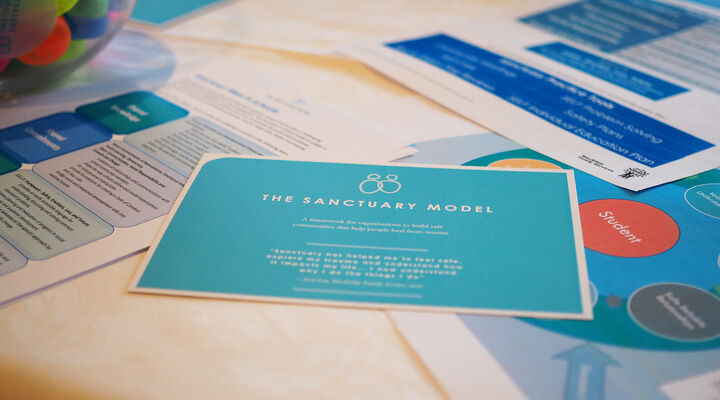Written by MacKillop Family Services CEO Dr Robyn Miller, this article first appeared in Parity magazine, Volume 35: Homelessness and Social Work
Social work continues to occupy a critical position in the purpose and practice of reducing and (ideally) eradicating homelessness in Australia. For those of us working in family services and out-of-home care, we are constantly looking to address the drivers of homelessness. Research has shown that almost two-thirds of young people experiencing homelessness have spent time in out-of-home care. Half the young people leaving residential care today in Victoria are likely to be homeless within three years. Recognising this dire reality and that change is needed, the Victorian Government has committed financial assistance to allow young people a longer and better supported transition to independent living.
Like many out-of-home care service providers across Australia, MacKillop Family Services (MacKillop) looks to evidence based and evidence informed programs as we strive to better meet the needs of the children, young people and families with whom we work, including those living in out-of-home care. While some have positioned the increasing use of evidence-based and evidence-informed practice and programs as sitting in tension to social work and social work practice, this view does not reflect our experience of contemporary practice. As a significant employer of social workers, we believe that rather than a threat to professional knowledge and practice, a focus on evidence has the potential to further animate both practice and the profession.
Our early intervention family support programs seek to prevent children coming into care and where young people are residing in out-of-home care, we seek to change their trajectory which too often points towards homelessness and the criminal justice system. The work we are engaged in is life changing and it’s important to draw on what has been proven to be effective.
The Australian Institute of Family Studies’ Communities for Children Facilitating Partners is an example of the current emphasis within public policy and practice of supporting evidence-based responses to the complex and changing needs of young people. MacKillop has developed, supported and implemented a number of programs within this listing which have been selected and approved for use following a review of their evidence base.
MacKillop has invested in establishing and contributing to independent evaluations as we build the evidence base across a suite of programs in relation to children, young people and their families. As we build, refine and deliver evidence-based, evidence informed programs at MacKillop, we recognise that their success depends upon practice which is trauma-informed and privileges reliable, responsive therapeutic relationships with children, young people and their families.
The Sanctuary Model, MacKillop’s overarching trauma informed organisational framework, supports staff to create a culture that prioritises safety and wellbeing. Sanctuary recognises that trauma is pervasive across human experience, not only for people who seek services, but also on people and systems providing services. The Sanctuary Commitments provide a set of values through which other evidence informed models are implemented across the organisation.
An example of a program that is of relevance to young people living in residential care is the Power to Kids program developed at MacKillop. Power to Kids upskills carers, building their knowledge and confidence to have ‘brave conversations’ with young people about sexual safety and providing them with strategies to intervene early when they see indicators of abuse. The program has been evaluated by the University of Melbourne who are also evaluating the national roll-out of the program currently underway.
Both the Sanctuary Model and the Power to Kids program share a trauma informed focus on rights-based approaches, creating safety, empowering service users, professional integrity, respect and addressing marginalisation – values consistent with the Code of Ethics of the Australian Association of Social Workers.
We know that young people entering residential care will bring unique worries and wishes and sadly experiences of abuse, neglect, violence and instability which will shape the way they view and interact with the world. Central to social work practice is advocacy to address disadvantage and marginalisation. The focus on evidence to both understand the issues and highlight potential social policy initiative has never been more important in practice.
A recent survey of young people in residential care at MacKillop gave a concerning insight into their experiences prior to coming to MacKillop. It found:
· 36% of young people had ten or more placements;
· 13% had 20 or more placements;
· 6% had 30 or more placements and;
· 2% had over 50 placements.
Can we expect even the most robust evidence-based programs to make a positive difference in the lives of these young people if we fail to attend to the structural context which normalises this level of instability and presents a significant impediment to embedding relational practice?
Our primary focus must be on allowing young people to establish a secure base – a base which can become the starting point for change. The Commission for Children and Young People’s 2019 systemic inquiry In Our Own Words found that children and young people with complex trauma, challenging behaviours and/or intellectual disabilities are at higher risk of placement instability in out-of-home care. Clearly these children and young people are amongst those most in need of stability.
It is through reliable, responsive, and consistent care, that young people, who may have never experienced attuned practice and care, might begin to build a healthy internal working model. They can be supported to develop a sense of worthiness and an expectation that others will treat them with respect and care.
There is an urgent need to address young people’s right to stability through the provision of housing stock and support services which are tailored to the diverse needs of young people leaving out-of-home care. Aboriginal and/or Torres Strait Islander young people and young people with disability are over-represented in this cohort.
Children and young people in residential care need to feel safe, welcomed and wanted; to know that they are missed and searched for if they do not return home. Staff need the capacity to spend individual time with young people within a stable care environment.
Adequately funded two-bed homes would support such a care environment and address concerns widely reported by young people. Stacey, quoted in the Commission for Children and Young People’s 2019 systemic inquiry In Our Own Words gives an insight into the lived experience of residential care and what is at stake:
It is hard with the number of kids coming through resi-care. One kid goes and in 20 minutes another comes in. […] We don’t get told who is coming or going out. That makes us [kids] angry more than we need to be (Stacey, residential care, 17)
As a system we can and should do better. We owe it to young people like Stacey.





